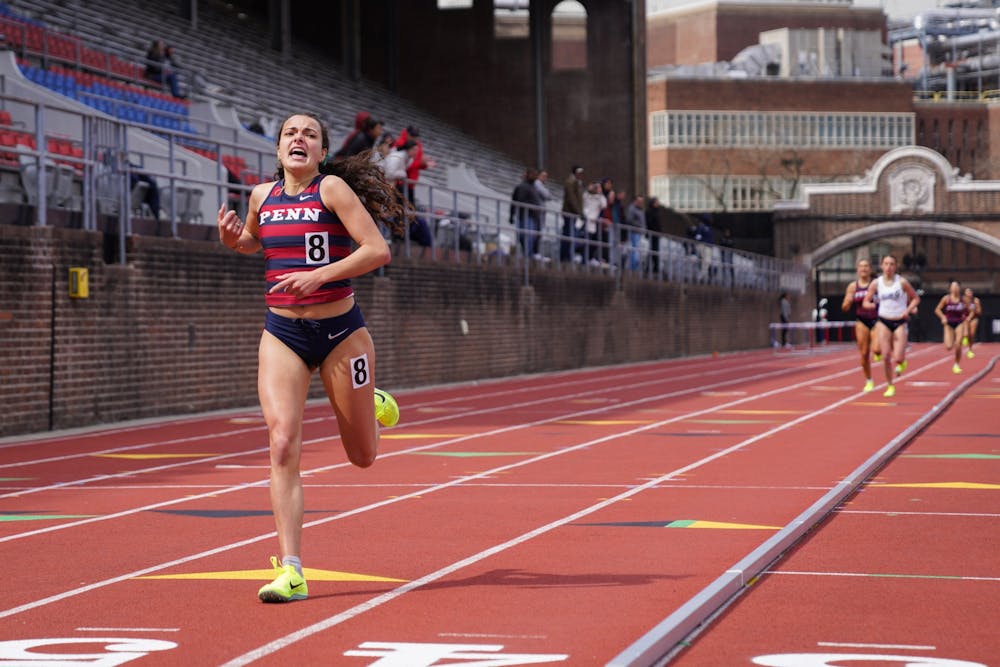Several years ago, before Penn track and field junior Liv Morganti ever donned the Red and Blue, she found herself in a position familiar to all distance runners: near the end of a race, nothing to give, everything to lose.
In the biggest race of her life at the New York state championship meet, Morganti rounded into the final stretch of her race, neck-and-neck with a competitor. In a sport centered around times, the outcome of all Morganti’s hard work would be determined by the seconds between her and her competitor. All the practice, all the prep, all the planning, had gotten her here — a few hundred meters from glory.
But as the pair approached the line, Morganti lost a step. Her opponent dug deeper, ran harder, and beat out Morganti by a hair. It was a devastating loss, but one that Morganti would use to fuel her improvement as a runner, and to ensure such a defeat would not repeat itself.
“I got second in the state meet because I got outkicked right at the line,” Morganti said. “After that, [the kick] was something I really focused on because I did not want that to happen again.”
What Morganti is referring to, and what so many distance runners spend so much time striving to perfect, is the period at the end of a long race in which the athletes give maximum effort to dial up their speed and cross the finish line as fast as possible — better known as the “kick.”
Each runner has a different strategy, a different affinity for the technique, but its importance remains the same across the board. In many cases, a good kick is the difference between winners and losers, between champions and spurned runners-up.
“Whether it’s scoring at the Ivy League championships, winning a race, or making it to the next round, all these situations come down to beating the person next to you,” coach Steve Dolan said.
“People talk about their personal bests but in the end, when it’s championship racing, it all comes down to: Can you win the race? Can you finish as high as possible? Can you outkick the person next to you?”
A kick is the result of meticulous preparation. After such intense exertion over a long race, it takes a great degree of fitness to muster speed in the final stages. Dolan says it is a matter of “practicing it, and doing workouts that allow you to execute it.” But there is also an intangible quality to the kick that is often what separates the best from the rest.
“There’s a big determination part of it,” Dolan said. “Sometimes you just see it at the end — it’s a pure determination of somebody to find a way to get there first. It’s something you can’t really quantify, but it definitely exists.”
The value of an elite kick cannot be understated. In last year’s Ivy League championship finals, the runner with the fastest final lap had an average finish of 2.25 across the men’s and women’s 1500-meter and 5000m races, and just one of them finished lower than second. Among the overall champions of each event, none had lower than the fourth-fastest final lap, highlighted by Penn’s then-senior Ray Sellaro who notched a 53.10 split on the last loop to hold off two storming challengers and win the title by a margin of just 0.17 seconds.
That importance, combined with the mental wherewithal required to pull off a great kick, make for a high-pressure situation as the race winds down — one that lives in the athlete’s mind for the duration of the run.
“During the race, you always have the looming knowledge of it,” Morganti said. “So you want to have something left, no matter what. Once you get to the last lap, you kind of know you can just lay it all out there and zone in on the people around you and the finish.”
Over the course of the season ahead, Penn’s distance runners will face plenty of final laps. Final laps with points, pride, and titles on the line. The outcomes will come down to their preparation, determination, and the effort they have poured into getting better with each run.
During this past indoor season, Morganti faced off with teammate and senior Lizzy Bader at the Scarlet Knights Open. The pair trained together every day, and led the race side-by-side from the opening gun. As the final stretch approached, they each picked up the pace.
“The last lap we were both going all out,” Morganti said.
This time, Morganti would not be outdone. With a seismic effort, she edged Bader at the line to win the race by 0.11 seconds. A race won, a runner redeemed.









